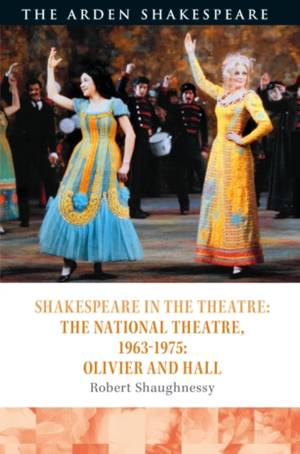
- Afhalen na 1 uur in een winkel met voorraad
- Gratis thuislevering in België vanaf € 30
- Ruim aanbod met 7 miljoen producten
- Afhalen na 1 uur in een winkel met voorraad
- Gratis thuislevering in België vanaf € 30
- Ruim aanbod met 7 miljoen producten
Zoeken
€ 228,95
+ 457 punten
Uitvoering
Omschrijving
The National Theatre's years at the Old Vic were the most Shakespearean period in its history, beginning in 1963 with Laurence Olivier's inaugural production of Hamlet, starring Peter O'Toole, and ending in 1975 with Peter Hall's production of the same play led by Albert Finney. Between them lay performances that included Olivier's then-legendary, now deeply controversial, Othello, a celebrated all-male As You Like It, the visit of the Berliner Ensemble with Brecht's version of Coriolanus, Franco Zeffirelli's festive Much Ado about Nothing, and Tom Stoppard's classic offshoot, Rosencrantz and Guildenstern are Dead.
Drawing upon a wealth of previously unseen material from the company archives, this book tells the inside story of the National's relationship with Shakespeare, within a landscape of institutional struggle, political upheaval and cultural transformation. Between them, the productions illuminate Olivier's legacy as an actor, his and Hall's achievements as directors, the role of the National in the Shakespearean careers of, amongst others, John Gielgud, Anthony Hopkins, Joan Plowright, Maggie Smith and Billie Whitelaw, its pioneering accommodation of European theatre practitioners, and its distinctive ways of engaging Shakespeare with the Britain of the 1960s and 1970s.
Drawing upon a wealth of previously unseen material from the company archives, this book tells the inside story of the National's relationship with Shakespeare, within a landscape of institutional struggle, political upheaval and cultural transformation. Between them, the productions illuminate Olivier's legacy as an actor, his and Hall's achievements as directors, the role of the National in the Shakespearean careers of, amongst others, John Gielgud, Anthony Hopkins, Joan Plowright, Maggie Smith and Billie Whitelaw, its pioneering accommodation of European theatre practitioners, and its distinctive ways of engaging Shakespeare with the Britain of the 1960s and 1970s.
Specificaties
Betrokkenen
- Auteur(s):
- Uitgeverij:
Inhoud
- Aantal bladzijden:
- 264
- Taal:
- Engels
- Reeks:
Eigenschappen
- Productcode (EAN):
- 9781474241045
- Verschijningsdatum:
- 17/05/2018
- Uitvoering:
- Hardcover
- Formaat:
- Genaaid
- Afmetingen:
- 127 mm x 203 mm
- Gewicht:
- 381 g

Alleen bij Standaard Boekhandel
+ 457 punten op je klantenkaart van Standaard Boekhandel
Beoordelingen
We publiceren alleen reviews die voldoen aan de voorwaarden voor reviews. Bekijk onze voorwaarden voor reviews.








